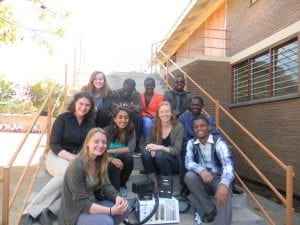We were thrilled that Christina Samuel joined the Global Health Fellows team in November. If you keep reading, you will get a glimpse of why we are so lucky to have her on the team!
Hi! I’m Christina and I have enjoyed the first few months of my fellowship. It is a privilege to work on such a dedicated and talented team.
I was born and raised in Blantyre, Malawi. I finished primary school at Zingwangwa Primary School and was selected to St. Michael’s Girls Secondary School in Mangochi. I then went to University of Malawi, the Polytechnic where I received a degree in Electronics and Telecommunications Engineering.
During the fourth year of my studies (2015), our Engineering department posted a summer internship opportunity from Rice 360° and I applied. I was so excited to be chosen! Together with fellow interns from the Polytechnic and Rice University, we visited Queen Elizabeth Central Hospital (QECH)—my first time there. We met with the staff from Physical Assets Management to better understand how we could help innovate affordable solutions to the challenges they face.

- Phototherapy lights are used to treat newborns with jaundice. We found that QECH uses an analog meter to measure the intensity of the light, unlike hospitals in high-resource environments which use a digital meter. Without the tools to calibrate the analog meter, the readings may not be accurate. Our team worked together to prototype an affordable version of the digital meter for use in low-resource settings to ensure the treatment is most effective.
- Suction pumps are commonly used throughout hospitals to remove excess fluid from patients. In hospitals in low-resource settings like Malawi pumps often reach capacity before a nurse can empty the fluid container, causing an overflow and the pump to break. We developed a meter that will automatically shut off the pump when the container is full, ensuring that more suction pumps do not end up in the equipment graveyard.
After my graduation from Malawi Polytechnic, Rice 360° collaborated with the College of Medicine at QECH on a validation study of a low-cost syringe pump to deliver magnesium sulfate to women suffering from pre/eclampsia. They needed to hire a technical monitoring and evaluation officer and I was the perfect candidate for the job! I worked for Rice 360° on the study up until this opportunity arose for me to take the lead on the project by becoming a Global Health Fellow.

My role as a fellow involves improving the current design of Kasupe, a low-cost, easy-to-use and maintain syringe pump for delivery of fluids and medication in a precise and controlled manner. Kasupe means “fountain” in my native language of Chichewa. The syringe pump has a continuous flow like a fountain even in power outages due to its internal battery.
I am excited to see how I am using my knowledge to help save and improve lives by designing a medical device than not only saves time for the nurses, but improves patients’ standard of care as well. I am focused on making Kasupe easier to use, repair and maintain; preparing training materials for the technicians; and conducting clinical trials. After speaking with partners at QECH and learning that they receive donations of a variety of syringe brands, I am designing Kasupe to be used with any type and size of syringe, unlike other pumps that can only accommodate one or two brands of syringe.
I am adjusting from the work environment in Malawi to the United States and am grateful to have such a supportive team around me. While I don’t know where this fellowship will lead me, my goal is to advance my knowledge in Public Health or Human Factors so that I can understand people’s behavior and the systems being used for promoting good health for all.